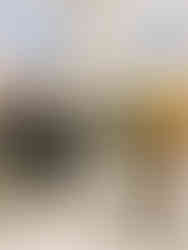Masters : Formative Assessment
- Lottie Matthews

- Jan 14, 2020
- 3 min read
Updated: Oct 29, 2023
Aim : Disrupting cognition and intellectualism to engage within a reflexive space to reflect and provide freedom, spontaneity and expression rather than direct instructional form, whilst questioning spacial / directional boundaries, spacial aesthetics and spontaneous joy
Presentation Planning
Hypothesis : How can freedom of space allow for unrestricted creativity?
A0 pieces of paper
Invitation :
Plain cards in date stamped brown paper envelopes filled with coloured confetti
I invite you to use the tools in the centre of the room, the surrounding pieces of paper and use ten minutes to respond to the space and statement ;
“ ;: Here ; Now”
Environment Aesthetics :
Open-plan
White space
Tables to the side
Central circular focus
Highlights of colourful emblems of “joy”
All art supplies kept in centre of room
Encouragement of the playful : ask to bring dungarees, painting smocks, etc;
Tools : A1 paper x 15 (Ideally A0 but unable to source)
Paint palettes, white and black paint, pencils, soft and hard charcoal, foam rollers, yarn, wide brush, bamboo sticks, sharpie pens, Indian ink
Suspended tools : Bubble wrap, cues and coloured pencils
Music : Playlist of Paolo Conte’s “Come di,” “Via com me” and “Happy Feet” - instrumental and playful, with lyrics in different language leads to less lyrical influence and building joyful spontaneity
Facilitating process :
Introduction of monochromatic materials then playful tools, such as rollers, bamboo, etc; and then introduce colour pencils and found objects - suspending (Seeley & Reason)
Led by a curated playlist of different themed music - embodied slow moving into happy, expressive pieces later on
No restriction of messiness - paint and hands on practice Involvement from the practitioner
Firm boundaries and instructions, but simple allowing for freedom and expressive pushing of creative ideas
No expectation for outcome of the process
Time planning :
Set up : Move tables to side of room, put plinths in centre, lay out basket of tools and paper in a central circle, put music on system
00:00 Introduction : Welcome and give out invitations
05:00 Introduce coloured pencils, musical instruments and bubble wrap into the room
10:00 Playlist ends and lead to reflection time
Observations :
Is there a natural push to connect or collaborate between individuals?
Do people feel comfortable?
Is there a sense of play or joy in the environment?
Did you feel a sense of collective or enhancement in the individual?
Does taking myself out of the equation allow for more freedom and innovative outcome?
Reflections :
I found that this process brought up questions regarding the facilitators role in creating boundaries and the limits between unspoken societal rules and a dialogue of restrictions and structure. Even though it was part of my pedagogical approach to take the position of observer rather than directly engage and lead the group whilst leaving the boundaries open-ended, I was aware that I was within a creative, trusted group of peers and therefore my intentions would be respected and in most terms, followed. However, within this reflexive space there was a specific enjoyment within engagement and a sense of reflection and play within the space. Specifically by drawing parallels between the tools also added to how reflexive the space would be, as there was engagement and imagination used way from traditional forms, but also led to a physical, visual and audial experience. Subsequent relation between individuals to form collaborative work, not only challenged my presumption that individuals would primarily work individually, but followed on from research that individuals naturally need to relate and form cognition with one another.




























Commentaires